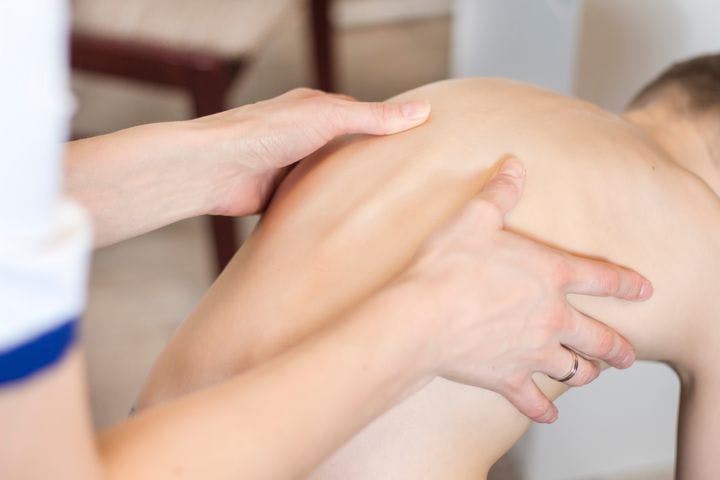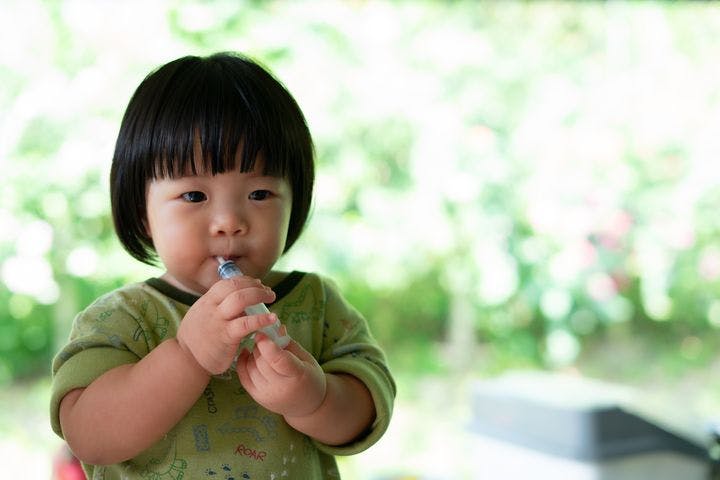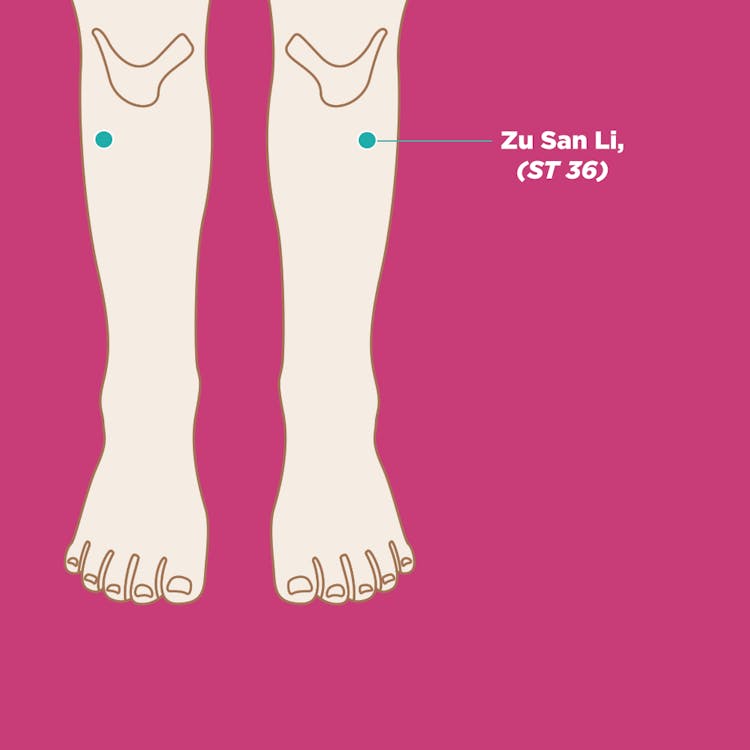How a Vitamin D Deficiency Can Affect Your Child’s Health
Published | 6 min read
A vitamin D deficiency in children can lead to poor growth and immunity issues. Watch out for the symptoms and learn what can be done.

Despite living in a tropical country, many Malaysians still have vitamin D deficiency. According to a 2022 study published in the Nutrients journal, 33% to 78.9% of Malaysian children are deficient in this essential vitamin.
The human body can produce vitamin D in the skin through adequate sun exposure. Your child can also get this nutrient from food. However, limited sun exposure, poor diet, or illness can keep your child from getting enough vitamin D.
Even skin colour is a factor. Darker skin has more melanin, which limits sunlight absorption. As a result, those with darker skin need longer exposure to the sun to let their skin produce enough vitamin D.
5 Signs Your Child Might Have a Vitamin D Deficiency
Vitamin D deficiency can lead to compromised health in children and affect them into adulthood. Here are some signs to look out for.
1. Slow and poor bone growth

Vitamin D interacts with calcium for strong and healthy bones to sustain bone mineralisation. Getting enough calcium may be easy, but this mineral won’t do much unless your child has enough vitamin D. As a result, you may notice that they aren’t growing at a normal rate, with poor bone development. Deformed bones like severely bowed legs could even be a sign of rickets, a condition characterised by soft and weak bones.
2. Frequent bone fractures
Yes, children get hurt a lot growing up. However, bones in healthy children heal quickly. If your child’s bones break frequently and take a long time to heal, they may suffer from severe vitamin D deficiency.
3. Muscle aches and general weakness
Vitamin D helps the body in absorbing minerals to maintain muscle strength. If your child complains of muscle aches, they could lack vitamin D. Another symptom is general weakness or lethargy stemming from weak muscles.
4. Irritability and being depressed
Research shows that vitamin D deficiency is associated with depression. A 2012 study of 104 adolescents in the US revealed that vitamin D deficiency was common in teenagers with mental illness. If your child is brooding more than the usual teenager,
5. Weak immune system
Studies have confirmed that vitamin D is vital to a healthy immune system. A 2022 article in the Cleveland Clinic Journal of Medicine suggests that vitamin D can help the body fight against
Aside from these symptoms, you should also watch out for the following risk factors for vitamin D deficiency:
- Epilepsy (note that taking anti-seizure medication can block vitamin
D absorption) - Spina bifida
- Chronic liver disease
- Atopic dermatitis
- Coeliac disease
- Cystic fibrosis
- Healing from bone surgery
How to Make Sure Your Child Gets Enough Vitamin D
Being outdoors and getting sun is the easiest way to get vitamin D. Ensure your child has adequate sun protection and is well-hydrated before going out.
While vitamin D synthesis happens in the skin, this mineral is also directly consumable through their diet. Foods naturally high in vitamin D include oily fish such as salmon, tuna, sardines, and mackerel. Egg yolks and cod liver oil are also rich in vitamin D. You may recall being fed cod liver oil as a child to prevent rickets.
However, researchers have noted that sun exposure and food alone may not be enough to ensure sufficient vitamin D levels. In these cases, supplementation is recommended. Talk to your paediatrician about vitamin D supplementation for your child.
How TCM Can Support Your Child’s Growth and Immunity
From a TCM perspective, the sun represents yang (warm, active, day energy) and qi (vital life force). Moisture can build up when you’re in an environment away from the sun or in a poorly ventilated area. “This translates to a body constitution comprising
She also adds that the Liver and Kidneys play a key role in synthesising vitamin D. If your child has poor Kidney or Liver function, they may have suboptimal serum levels of D3, an inactive form of vitamin D.
Herbal medicine

For fatigue, Bu Zhong Yi Qi soup (补中益气汤)
“Depending on the syndrome, if the issue arises from an accumulation of phlegm and Dampness, consume Si Shen soup (四神汤) to remove Dampness and strengthen the Spleen. You may also consider Si Shen brown rice,” recommends Physician Lim.
“American ginseng tea would be suitable if your child tends to sleep late. Many parents also let their children consume the
Some herbs that enhance Kidney function include Dioscoreae rhizoma or Chinese yam (shan yao, 山药) and Rehmannia root (sheng di huang, 生地黃).
Acupuncture and tuina massage
Researchers in Zhejiang, China, demonstrated that acupuncture could raise vitamin D levels in children of short stature. These findings indicate the possibility of acupuncture as a therapy for slowed bone growth due to vitamin D deficiency.
“If you wish to relieve the discomforts in your children, consider paediatric tuina massage and acupuncture, which can improve circulation, relieve pain, relax muscles, and reduce inflammation in the joints or soft tissues,” adds Physician Lim.
She recommends acupuncture to be administered by a qualified TCM practitioner on the following acupoints to enhance Kidney and Spleen function and promote
A vitamin D deficiency may be common, but it can be addressed. Note that other ailments could also cause the symptoms in this article. As always, work with your paediatrician and TCM physician before starting your child on any supplementation and treatment regi
References
- Multi-Disciplinary Publishing Institute (MDPI) – Nutrients. 2022. An Update on Vitamin D Deficiency Status in Malaysia. [online] Available at: <https://www.ncbi.nlm.nih.gov/pmc/articles/PMC8838715/> [Accessed 7 November 2022]
- Indian Dermatology Online Journal. 2020. Sun Exposure in Children: Balancing the Benefits and Harms. [online] Available at: <https://www.ncbi.nlm.nih.gov/pmc/articles/PMC7001416/> [Accessed 7 November 2022]
- Cleveland Clinic. 2020. Do Babies Really Need Vitamin D Supplements?
- Why vitamin D drops are important for baby’s health. [online] Available at: <https://health.clevelandclinic.org/do-babies-really-need-vitamin-d-supplements/> [Accessed 7 November 2022]
- Cleveland Clinic. 2022. Vitamin D Deficiency. [online] Available at: <https://my.clevelandclinic.org/health/diseases/15050-vitamin-d-vitamin-d-deficiency> [Accessed 7 November 2022]
- Cleveland Clinic Journal of Medicine. 2022. Vitamin D supplementation: Pearls for practicing clinicians. [online] Available at: <https://www.ccjm.org/content/89/3/154> [Accessed 7 November 2022]
- KidsHealth.org. 2021. Vitamin D. [online] Available at: <https://kidshealth.org/en/parents/vitamin-d.html> [Accessed 7 November 2022]
- BMC Psychiatry. 2012. Vitamin D deficiency and psychotic features in mentally ill adolescents: A cross-sectional study. [online] Available at: <https://bmcpsychiatry.biomedcentral.com/articles/10.1186/1471-244X-12-38> [Accessed 7 November 2022
- Frontiers in Pharmacology. 2021. Cordyceps spp.: A Review on Its Immune-Stimulatory and Other Biological Potentials. [online] Available at: <https://www.ncbi.nlm.nih.gov/pmc/articles/PMC7898063/> [Accessed 7 November 2022]
- Evidence-Based Complementary and Alternative Medicine. 2021. Influence and Effect of Acupoint Application of Chinese Medicine on Height and Bone Age of Children with Short Stature. [online] Available at: <https://www.ncbi.nlm.nih.gov/pmc/articles/PMC8570854/> [Accessed 7 November 2022]
- Saudi Pharmaceutical Journal. 2020. Potential mechanisms of Chinese Herbal Medicine that implicated in the treatment of COVID-19-related renal injury. [online] Available at: <https://www.sciencedirect.com/science/article/pii/S1319016420301730> [Accessed 7 November 2022]
Share this article on










